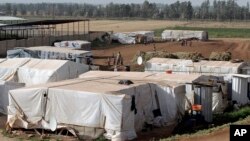U.N. humanitarian chief Valerie Amos said Thursday that 10.8 million Syrians are in need of humanitarian assistance - 1.5 million more than just six months ago.
Valerie Amos returned to the Security Council for the fourth time since Resolution 2139 was adopted in February demanding that the Syrian government and opposition facilitate the work of humanitarians and stop obstructing aid deliveries.
In what has become a disturbing trend, she reported that instead of the situation on the ground improving, it is becoming worse.
“Once again, I remind this council that targeting or indiscriminately attacking vulnerable civilians constitutes a war crime," she said. "There can be no justification for such action. Deliberately obstructing humanitarian access and depriving civilians of access to services essential to their survival, is unlawful and inhumane.”
She said 4.7 million Syrians live in hard-to-reach areas - an increase of more than one million people since the resolution was adopted four months ago.
More than 240,000 people live under siege conditions. In the past month, Amos said less than 2,500 people - or one percent - of this group - received food aid.
Syria’s U.N. envoy, Bashar Ja’afari, dismissed Amos’s report, saying it had “grave falsehoods and gaps” and questioned how she arrived at such “blown up numbers” of needy Syrians.
In February the council set aside its political divisions over Syria and unanimously adopted the resolution calling for better aid access. In it, the 15-nation council signaled its intent to take further steps if the parties did not implement its demands.
Efforts to agree on what those further steps should be have been moving slowly. For several weeks, council members have been negotiating the text of a follow-up resolution that would seek to allow cross-border aid from Turkey, Jordan and Iraq - a move the U.N. says could help them reach at least 1.3 million more Syrians.
Divisions among council members about how to do this remain.
Russian Ambassador Vitaly Churkin said his delegation has proposed a deal that has Damascus’ blessing which would allow aid to cross Syria’s borders after inspection by U.N. humanitarian monitors at the border.
"If they really want to reach those two million people in need through those crossings, this is an opportunity to do that," he said.
Australian Ambassador Gary Quinlan, who along with his Jordanian and Luxembourg counterparts, drafted the earlier aid resolution and are working on the follow-up measures, said there are concerns about how the Syrian government would want to implement such a proposal.
“What we would effectively be doing in the way in which the Syrian government is approaching the model that has been put forward by Ambassador Churkin, is reducing the level of access and increasing the restrictions on what little distribution there is to areas other than government-controlled areas we currently have," he said. "That is unacceptable. It cannot work.”
Quinlin said it is not just a matter of getting aid into Syria, but distributing it to both opposition and government areas once there.




